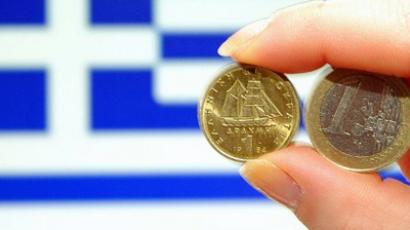Grexit could have Lehman effect - experts

Greece’s departure from the eurozone could create a domino effect for debt-choked Portugal, Spain and Italy, similar to that caused by the Lehman Brothers bankruptcy in 2008, experts say.
“Greece could become another massive shock for financial markets. Greece exiting the eurozone will be complicated technically, but also it could result in contagion, meaning investors would try to test other members,” Elina Rybakova, chief economist at CITI Russia & CIS says. Experts agree that a Greek exit from the single currency – dubbed Grexit – would bring other vulnerable countries such as Portugal, Spain and Italy under test as investors would try to establish which one could be next. “An orderly exit of Greece is possible only if you can isolate Greece as a special case,” warned Rybakova. Outgoing World Bank President Robert Zoellick expressed his concern on the "ripple effects" on the rest of the eurozone if Athens drops out. "The core question will actually not be Greece, it's Spain and Italy," Zoellick said during a forum in Washington."Where the danger comes in is when events come, they start to affect confidence and you get illiquidity moments," he warned.A probable Greek exit would also affect confidence in the banking sector beyond that country. Banks of other states are also coming under stress, as Moody’s downgraded 26 Italian banks and 21 financial institutions.Meanwhile the said it would temporarily stop lending to some Greek banks to limit its risk. European Central Bank head Mario Dranghi said the ECB would push the responsibility for lending to the Greek central bank until the country’s banks have sufficiently boosted their capital.“The exit of Greece and especially of any other big country would mean huge contagion through the banking channel: a lot of depositors will try to leave the country,” Rybakova said.Meanwhile, Greek depositors have already withdrawn about 1.2 billion euro during the past two days amid growing fears of an upcoming eurozone exit. Over the past two years, 2 – 3 billion euro has been withdrawn from Greek deposits every month. In January, the deposit outflow reached 5 billion.Analysts agree that if Athens eventually gives up the euro, this will create a stressful moment on the global market, but the scale of the consequences is not yet clear.“If the ECB comes in forcefully with extraordinary measures to contain the crisis, it will still be a very stressful environment, but it will be less stressed than a catastrophe,” Ebrahim Rahbari, global economist at Citi told RT. “If we don’t see a credible response, the consequences could be very grave and it could be much worse than Lehman.”Earlier this year, the International Institute of Finance (IIF) calculated the losses from a possible Greek default. The losses would be above 1 trillion euro, with credibility of other European states hard hit, according to the IIF. China, India and Brazil, big exporters to the eurozone, would also suffer, with China seeing exports shrink by 4%, and India and Brazil by 2% each.














